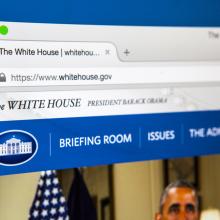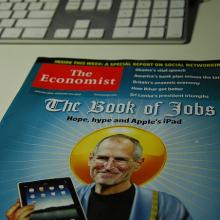Apple
ON JAN 9, 2007, STEVE JOBS stepped onto a stage in San Francisco, his trademark black mock-turtleneck blending with the shadowed backdrop, his clipped hair and lean countenance offering a monk-like silhouette against the screen.
Jobs stepped forward and raised his arms. And there it was, almost inconspicuous in the palm of his hand. “Today, Apple is going to reinvent the phone ... here it is ... the iPhone.” Naming a new god.
At the time, no one consciously believed that smartphones, the internet of things, or ubiquitous computing would save us. Yet, as the encyclical Laudato Si points out about technocracies: No one has to actually believe they’re gods. They become gods when we start investing our hope and identity in them.
And here we are. We live as if the connections provided by digital technologies are vital—and indeed we have made them so.
A decade after the first iPhone, environmental engineer Braden Allenby was asked whether, one day, humans would be wired directly into the internet. “Look at any city street,” he replied. “At least half the people are looking at their phones. We’re already integrated into networks beyond our physical environment.” Heads bowed, praying to strange new gods.
It began as allure: more accessible music, easier communication, maps and directions. Then it slid toward addiction: picking up the phone in the morning, like a first cigarette of the day. And now, dependence: Our lives are synced, our habits surveilled, our data monetized, and the world goes ’round. Our little intimacies power a vast machinery.
All in the name of improving our lives.
In this issue, we take a careful look at the twisted logic—and theology—that brought us Facebook, iPhones, 2-day shipping, Alexa, and 1,700,000,000 search results in .48 seconds: “Innovation is always good, and more is always better. Create powerful technologies, improve humanity and the planet, and make piles of money. This is the secularized spirituality of Big Tech at work, buffering it against any ability to contemplate its own potential evil,” writes Gaymon Bennett.
A deal has fallen apart to undo the North Carolina law known as the “bathroom bill,” in a sign of the state’s bitter political divide.
The state’s legislature was called into a special session on Dec. 21, to consider repealing the law known as HB2 after months of pressure, including lost jobs and canceled sporting events and concerts.
1. Top 10 Takeaways from ‘Amoris Laetitia’
“We should no longer talk about people “living in sin.” A great analysis of Pope Francis’ new document on the family from America magazine.
2. Keystone Pipeline Leak Worse Than Believed
According to TransCanada, the pipeline could have leaked nearly 17,000 gallons in South Dakota — and they’ve “yet to pinpoint the source.”
3. WATCH: 7 Reasons Men Should Not Be Pastors
This must’ve struck a nerve. It’s the most-viewed thing we’ve ever done!

Pope Francis registers for World Youth Day with an iPad. Image via REUTERS/Max Rossi/RNS
The pope of the digital age is set to attract even more followers with the posting of his first Instagram photo. Having already claimed the title of the world’s most influential leader on Twitter—with over 27 million followers across his nine accounts—Pope Francis has a new social media platform in his sights.

Image via ymgerman/Shutterstock.com
There are two things that make this order very dangerous, Opsahl said. The first is the question it raises about who can make this type of demand. If the U.S. government can force Apple to do this, why can't the Chinese or Russian governments? The second is that while the government is requesting a program to allow it to break into this one, specific iPhone, once the program is created it will essentially be a master key.

Image via chrisdorney/Shutterstock.com
The meeting comes as nations around the world fight a sometimes losing battle against the highly-skilled online outreach of the Islamic State, which has done a remarkable job of using social media to create recruitment and public relations materials to promote its efforts. Apple, Facebook, and Twitter said Thursday they will have representatives at the meeting.
If you’ve been reading our blog or have checked your iTunes last week you’ve noticed the power couple of Steve Jobs’ ghost and Bono working together again. (Anyone rememberthe U2 iPod?) I’ll leave it up to music critics to debate the musical quality of the album and the potential violation of the now infamous iCloud downloading music for each Apple user. But there is one other issue to discuss regarding the U2’s recent release: God.
In a recent article published by The New Yorker, author Joshua Rothman takes an in-depth look into the spirituality of what some would call the world’s most popular rock band. Throughout the years, Bono’s religious roots have not been a secret. Books such as Get Up Off Your Knees: Preaching the U2 Catalog and We Get to Carry Each Other: The Gospel according to U2 have been published within the last decade. The Archbishop of Canterbury has addressed Bono in lectures and Bono has preached at the National Prayer Breakfast.
One of the most interesting aspects of Rothman’s article was the citing of “churches around the world celebrating U2charists.” Churches as far as the Netherlands, Austria, Mexico, and as close as Iowa, Baltimore, and Maine have celebrated U2charists, a communion service accompanied by U2 songs in lieu of traditional hymns. Rev. Paige Blair, of St. George’s Episcopal Church of Maine, was one of the first religious leaders to host such a service. According to Rev. Blair:
“the liturgy itself is pretty traditional — it has all the usual required elements: a Gospel reading, prayers, and communion from an authorized prayer book. The music is really what is different. And yet, not so different. It is rock 'n roll, but it is also deeply and overtly spiritual.”
By now you have heard that Apple gave you music. Free music. From U2. Now, they paid U2 a lot of money for those tunes and it's pretty clear that it's not the first time that someone paid a U2 a lot of money for their music so that you could have it for free as long as you were a loyal customer.
The U2 back catalogue has done pretty well this week.
Some of us are rather peevish customers, it would seem. There have been numerous articles on the betrayal by either U2 or Apple. Don't they know that our iDevices are private property? Don't they know that we have put a fence around our little corner of the cloud?
Sadly the tech doesn't really work that way and the agreement you checked - we all checked, really - makes it pretty clear that they own the cloud and you merely lease space there. Your iDevice is a portal, no more, no less.
Perhaps you heard. U2 has a new album. You can download it from iTunes for free right now. Go. I'll wait. It's free.
Yes, free. This is what has my mind spinning right now. Bono wrote:
"It’s also free to everyone on iTunes thanks to Apple. To celebrate the ten year anniversary of our iPod commercial, they bought it as a gift to give to all their music customers."
So, free to us thanks to the largesse of Apple. Why would that be? Well:
"We’re collaborating with Apple on some cool stuff over the next couple of years, innovations that will transform the way music is listened to and viewed. We’ll keep you posted. If you like Songs of Innocence, stay with us for Songs of Experience. It should be ready soon enough … although I know I’ve said that before …"
The new movie about Steve Jobs is short on anything explicitly religious. Like its main character, however, it’s got a thread of transcendence running through it.
The truth about Jobs and religion may be that, in this arena as in others, he was ahead of the cutting edge.
The film isn’t making the purists happy, in part because it takes too many liberties with history. But it’s not a documentary. I’ll go against many of the reviews and say that Ashton Kutcher does a pretty good job at representing the personality found in Jobs’ speeches and in what has been written about Jobs — particularly in the massive authorized biography by Walter Isaacson.
One quote in that book, from one of Jobs’ old girlfriends, pretty much captures the character in the film: “He was an enlightened being who was cruel,” she told Isaacson. “That’s a strange combination.”
NEW YORK — The ancient dream of making money by simply moving money took a hit last week when Citibank announced plans to lay off 11,000 workers.
Across town, the dream of making money by actually making things – a dream that had seemed lost to foreign labor – got a boost when Apple's boss Tim Cook announced plans to make some computers in the U.S.
Citibank's move sent shock waves among people educated to take meetings, crunch numbers, and parlay networking into fees for passing money through their hands. There's no actual creation of wealth; just dipping a large ladle into wealth as it flows past.
Apple's small and somewhat symbolic move, by contrast, stirred hope that manufacturing might return again to American shores and stimulate the manufacturing wages and productive attitudes that once built a middle class.
Here it is, the “resolutionary” iPad3, with breakthrough retina display, quad-core processor and 4G LTE wireless connectivity. This next-generation technology is captivating and if you’re an Apple fan, as I am, you’re going to want to trade in your iPad2 and put your name on the waiting list for the iPad3.
And yet, as a human rights activist, it gives me pause. With the innovation of the iPad 3, comes some critical missing features — including conflict free minerals from eastern Congo. To date, Apple has been a leader on this issue, but I know they can do more.

Kodak camera. Image via http://www.wylio.com/credits/Flickr/2992854214
Lately I’ve been thinking about why it’s important for an organization, be it religious or for-profit, to be more cannibalistic.
In the late 19th century, Kodak emerged as a trailblazing company that ultimately brought photography to the masses. An American-born business, the golden boxes of film became synonymous with family photos and even professional photography.
As a little guy, I had one of their Instamatic cameras, and I remember the eager anticipation of sending of the film and waiting the two weeks or so to get the results back.
Suffice it to say the landscape for film and imaging has changed radically in the meantime.
Now, practically every electronic device we carry has a still picture or video camera embedded in it. And for less than a thousand dollars, a photography enthusiast can buy a camera that not only shoots digital images that rival most professional film renderings; they also can shoot high definition movies and edit the videos on their laptop computers.
It may not surprise many that Kodak has suffered greatly at the hands of this digital revolution. The company has failed to post a profit in many years, and recently filed for bankruptcy.








